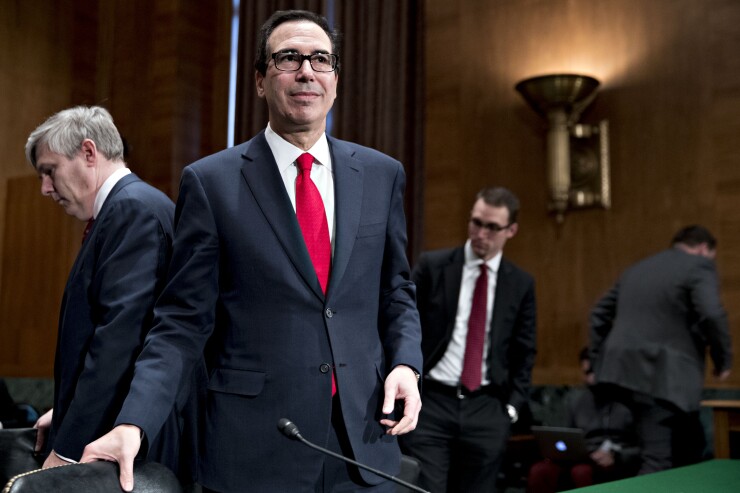WASHINGTON — Treasury Secretary Steven Mnuchin on Tuesday provided new details on Financial Stability Oversight Council efforts to revise its nonbank designation process.
Mnuchin, testifying before the House Financial Services Committee, indicated that the FSOC will issue a proposal on criteria for designating firms before enforcing a new methodology. He also provided comments about steps to reform the Volcker Rule, revealed work on a report dealing with the Orderly Liquidation Authority and fielded questions on housing finance reform.
The Treasury Department

“We’ll now be working with the [House] committee on suggestions in terms of changing the criteria” for SIFI designations, Mnuchin, who chairs the council, said during the hearing. “I believe we will have to put out a notice of proposed rulemaking before we enforce it but this is something we’re very focused on for this year.”
Rep. Blaine Luetkemeyer, R-Mo., has proposed legislation under which the FSOC would adopt the same risk-scoring system that the Federal Reserve Board uses to assign ratings to systemically important banks. Currently, any bank above $50 billion in assets is considered "systemically important," but the bill would substitute the Fed’s risk-scoring system for that numeric threshold, which many groups argue unfairly captures smaller banks that pose less risk than the megabanks.
“We don’t need to reinvent the wheel if the Fed is already doing the analytical work,” Luetkemeyer told Mnuchin. “It would seem to be a very helpful tool for FSOC to be able to utilize that.”
Mnuchin responded that he has not seen the Fed’s risk scoring system “but we will look into that.”
“I think that’s something we should consider,” he said.
Mnuchin also continued to support changes to simplify the proprietary trading ban known as the Volcker Rule. Many lawmakers and regulators agree with the administration that the rule is too complex and needs clearer definitions.
Mnuchin added that he would also support having one federal financial regulator taking the lead in revising the trading ban rule.
“Some people have suggested that be the Fed and then have the other agencies play a supporting role so that there could be better coordination and better leadership on it,” he said.
Another high priority for the Treasury are recommendations on the future of the Orderly Liquidation Authority. The OLA, which was established by the Dodd-Frank Act, authorizes the government to appoint the Federal Deposit Insurance Corp. as receiver for a failed financial behemoth — taking its resolution outside the bankruptcy courts.
President Trump ordered the Treasury to look into whether the authority should be repealed, something Republicans have long supported. Mnuchin steered away from giving an opinion on the topic but said he expects the Treasury to release a report on the OLA within the next month.
Republican Rep. Dave Trott of Michigan said he would support a combination of repealing the authority and replacing it with a bankruptcy code to resolve large financial firms that fail.
“As a former bankruptcy attorney, I happen to believe that a new subchapter in the bankruptcy code is a much better way to deal with an insolvent financial institution than a politically appointed bureaucrat sitting in secret in a private room,” Trott said.
Mnuchin fielded a broad swath of questions ranging from cybersecurity, to tax policy and the Russia sanctions.
On housing finance reform, he acknowledged concerns about the length of the conservatorships for Fannie Mae and Freddie Mac and the need for reforming the government-sponsored enterprises.
However, he added that any reforms to Fannie and Freddie should include making sure that the bulk of mortgage risk does not inadvertently move to the Federal Housing Administration.
“I want to be very careful that we don’t solve the taxpayer issue in one area, only to find out that the market share of FHA has gone way up and we have taxpayers at risk” in another area, Mnuchin said.





